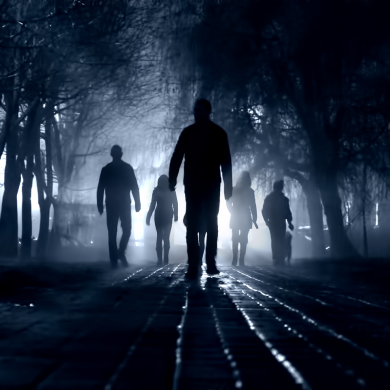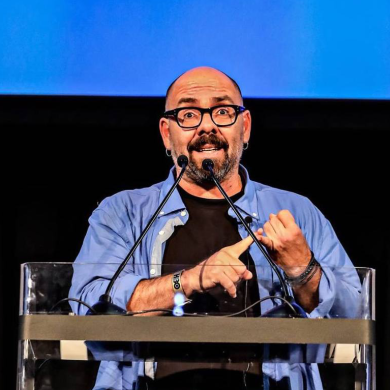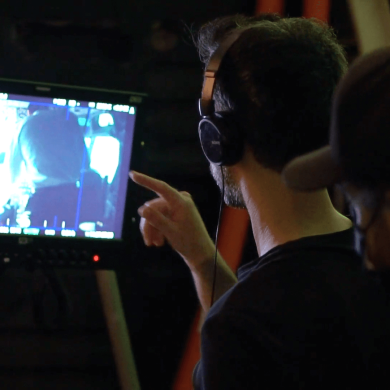By Justin Sanders
Behind every Pat Sajak, Alex Trebek, or Steve Harvey, there stands a Noah Bonnett – an executive producer (EP) waiting in the wings, making sure the game shows of the world run smoothly.
Producing any live television show requires a singular combination of logistical wherewithal, managerial talent, quick thinking, and sheer showmanship. When the show in question is a game show, there is an additional quality that comes in handy: a very clever, very specific strain of conceptual creativity, which enables the design of puzzles and competitions that are as fun to play as they are to watch.
As EP, or co-EP, on past and present game shows such as TBS’ Separation Anxiety, Nickelodeon’s Emmy®-nominated BrainSurge, and Universal Kids’ Beat the Clock, Bonnett oversees each new project “from start to finish,” he says. “From lighting to wardrobe, from casting to format, prizing, budget, post, and editing. You name it.” But he also, in between these contractual gigs, seeks to make his own game shows from scratch, constantly developing ideas for new, original formats and testing them out, hoping that one might catch on and become the next Wheel of Fortune, Jeopardy, or Family Feud.
While Bonnett has had some success with his own creations – his 2009 effort 20Q was picked up by the Game Show Network for a season – the big hit still eludes him, but therein also lies the fun. Of all the many duties demanded of the executive producer, Bonnett enjoys the creative work most of all. He relishes the process of “figuring out the game in pre-production,” he says, “tweaking and getting it just right. I like trying different things and experimenting. It’s like a little laboratory.”
Justin Sanders: Creating and producing game shows is such an incredibly specific thing to do, I’m curious about the path that might lead one to do it. Were you a big fan of game shows growing up?
Noah Bonnett: Yes. I remember vividly the excitement I felt when I got to stay home from school and watch a good, classic game show.
What was your favorite game show to watch?
Probably The Price is Right.
Did you have an inkling at the time that you might one day want to work in the television industry?
No. My passion for television only extended to watching a ton of it.
When did it occur to you that television might be an industry you wanted to work in?
I was a political science major at Washington University in St. Louis, and I was on my way to law school, but every time I talked to my older friends in that line of work, they didn’t have smiles on their faces. So, when I graduated college, I went back to my hometown, Washington D.C., to work in our family’s metal recycling company for a summer – before realizing that wasn’t what I wanted to be doing either.
I wanted to try a new city, and I had some friends out in Los Angeles, so I came out here. Since I had spent so much time watching television as a kid, it only made sense that I get a job in television. Also, my older brother worked in entertainment, so that was somewhat of an inspiration to me.
So, you arrived in L.A. with a political science degree and some work experience in the recycling industry. How on earth did you go about getting your first job in show business?
Back in the day, United Talent Agency (UTA) had an email job list that I got on – this was before job websites and all that stuff. Through that, I learned about a job at Comedy Central – assistant to the Senior Vice President of Talent. I went in for it and they called me back to say, “You didn’t get the job.”
I said, “I appreciate you calling me back. If you hear of anything else, let me know.”
The next day, that same person at Comedy Central called again and said, “I know about this assistant job over at Sony. I put your name in. I think you’d be great.”
So, I went down to Sony, which was then called Columbia Tristar Television Distribution, and I interviewed for a job as assistant to the Senior Vice President of the unscripted television department. And, I landed the job. I was her assistant for about a year and a half.
Assistant jobs are very competitive in Hollywood. Usually it’s a who-you-know kind of thing to even get your foot in the door. How did you get the Comedy Central rep to notice you with nothing but a blind application?
I was very honest about my lack of experience: I didn’t do anything in entertainment in college. No TV internships, nothing. I had a cover letter that was frank about that and had a little personality to it, and I think I just stood out from the rest of the crowd.
What was it like, diving right into a position like that with no prior experience in entertainment?
I enjoyed it right away. I loved hearing how [my boss] navigated all the different personalities. I listened in on her calls, and used the opportunity to read Variety and The Hollywood Reporter, and try to figure out how the business works and who was who.
This was the year Survivor premiered, and also Who Wants to be a Millionaire? I remember one time, right before the Survivor finale, the winner of that season’s competition, Richard Hatch, came into our office for a talent meeting. He hadn’t been officially announced as the winner yet. We knew before the entire country. It was a very exciting time to be working in the world of unscripted television.
When did the game show element enter the picture?
I realized I really enjoyed visiting the sets of shows, when my boss would take me to them.
At some point, Sony’s remake of the old game show Pyramid went into production – with Donny Osmond as the host. I had seen the development of it and knew the players involved, and I thought it would be a lot of fun. I asked my boss if I could work on it and she said, “Sure.” So, I went to work as a writer’s assistant on Pyramid.
What did your job as writer’s assistant entail?
I basically formatted and proofed any text that appeared on-screen, prepping it for electronic display. I also helped with keeping score and with judging during the live tapings.
After the first season, when it was time for a hiatus, I quickly learned about the perils of freelancing and had to find myself another job – which I did. One game show became another one. I got bit by the bug and I’ve been primarily focusing on game shows ever since.
There is also a very viable career in writing for game shows. It sounds like you were starting to go down this road, but then deviated toward producing. Why?
At the end of Season 1, I asked the executive producer on Pyramid if I could be a writer for the show, and he said, “Well, why don’t you put together a packet?” I did, and in hindsight, it wasn’t that great. He didn’t promote me but he had some very good words of advice.
He said, “Noah, writing can be a lot of fun and, yes, there are a lot of benefits, but you might have a longer career if you oversee the writing – and I think that one day, you will.”
That must have been a thrilling thing to hear, that kind of endorsement from someone so important. What do you think the executive producer saw in you that compelled him to say such a thing?
A certain energy and personality. A knack for logistics, showmanship, and working with people.
Once you realized that you were going to head down the producer track, how did you then start working your way toward that goal?
I started climbing the producer ladder by continuing to work on various game and unscripted shows, in roles like segment producer, challenge producer, and eventually, supervising producer. That led to working as a co-executive producer, and then I sold my first game show, and was able to jump up to full-on executive producer.
What was the first game show you sold?
The first show that I sold was called 20Q, in 2009. It was based on a toy that Mattel distributes with the same name. It’s a little ball that plays 20 Questions with the user. I optioned the rights to the toy and sold a show based on it – at first as a syndicated game show.
We did a pilot but they didn’t pick it up. Then we sold it as a series to the Game Show Network. Cat Deeley was the host. The format for the show also sold to a few territories around the world.
It only got one season, but once I sold it, it gave me the confidence to do it more. So since then I’ve been developing my own stuff and collaborating with people, and trying to bring more shows to the marketplace.
How does packaging and selling a show for syndication, in which it will go out to multiple local television stations, differ from selling it as a series, where it is exclusive to one network?
Selling a syndicated show is different for two main reasons.
For one, syndicated shows frequently get aired by stations during the day, and there’s a different audience and vibe during the day than what you might see at night.
Secondly, as syndicated shows generally air five days per week, you have to think of how the show can run each day, as opposed to once a week. Also, a nighttime network series might see more families watching together, which definitely affects how you develop it.
What is the process of “selling” a show like?
I usually start with a general concept. It could be a hook, a set piece, something I’ve observed in the world, or maybe it’s a piece of intellectual property. Then I brainstorm all the different ways this could become a game show. What does it build to? What’s the emotional story?
Next, I might play the game with some friends and family to see what’s going on. After that, I develop an in-room pitch that most likely has the potential buyer playing the game. You want them to feel the same energy that not only the players on stage will feel, but how the audience will play along as well.
Then you actually have the meeting with potential buyers, cross your fingers, and hope they call with good news!
In between developing and trying to sell your own material, you continue to work for hire as an EP on game shows by other folks, yes?
Yes. Usually a company will hire me to oversee the production of a game show.
What does overseeing the production of a game show entail, exactly?
The first step is to figure out, “What is this show?” We have to test it. In the game show world, there are a lot of live run-throughs and tweaking of the format to make sure it works perfectly. A lot of rehearsal. Then we’re in production, taping it, and afterwards, we’re editing it.
The whole process usually lasts about 6 months. I oversee all aspects of the development and production of the show from start to finish, from lighting to wardrobe, from casting to format, prizing, budget, post, and editing. You name it.
How do you keep track of everything?
I hold people accountable and I follow up. It all comes down to surrounding myself with the best people, inspiring them, having fun with them, getting the best out of them, and staying above it all – that’s how I’m able to stitch it together.
Does that mean you handle the hiring of everyone, too?
I hire the department heads and let them hire their teams. There are some positions where I want to know who the people are. I’m not going to interview every camera operator, but I might want to talk to the stage manager.
I like to hire the people I’ve worked with in the past. If I’m happy with your work, I will certainly recommend you and bring you back for more.
When does it get most insane during production? Is it during the taping itself?
I would say the craziest is the week before production, when you are putting the final tweaks on the show.
Once you’ve gone into production, if you’ve done your job right, then you’re just able to be in the moment during taping. It’s really leading up to it when, to me, it’s most chaotic.
What is your favorite part of the process?
Figuring out the game in pre-production, tweaking and getting it just right. I like trying different things and experimenting. It’s like a little laboratory. You absolutely have to get that stuff right before you get onstage. There is no room to experiment once the cameras are rolling.
I went and watched a taping of Jeopardy one time, and was amazed at how quickly the production moved – like a well-oiled machine. Do your shows move at a similar speed during taping?
I hope that one day a show I’m working on moves with the same speed and efficiency as Jeopardy or Wheel of Fortune. But, there is always a certain urgency on tape day, and that’s why you have to have all your ducks in a row.
Do you have any game shows on-air right now?
I recently wrapped a show called Beat the Clock. It’s a ’50s show we brought back for the Universal Kids network, a fun family-friendly physical challenge competition show. It debuted in February.
JS: Is it by choice that you work gig-to-gig? Why not get hired on staff somewhere?
NB: I could go work for a production company or a network, but I really enjoy being able to choose the projects that I want to work on.
How do you find each new project at this point? Somehow, I doubt you’re still going off the UTA job email list.
Word of mouth. I have an agent who sometimes will come up with a lead. They’ll hear something from another client on their roster, or a potential employer will ask my agent if they have somebody. A new job can come from anywhere.
At what point did you become aware that you needed an agent at all?
My agency actually found me. They reached out to me and asked to represent me. I sat down to hear how they could be of service and have been with them for over a decade.
For actors and writers, everyone is fixated on getting an agent. Is it the same for producers? Does every executive producer ultimately need to get an agent?
I would say that most of the EPs I know have agents, because it’s helpful. The agency is going to be able to package their talent with producers who can deliver, and vice-versa. Some great game show formats have come from that producer/agency dynamic.
You talked about how the show you sold, 20Q, got picked up in a few places outside the United States. Is that the ultimate goal – to create something that can travel?
The idea is to come up with something that can work not just here in America, but in territories all over the world. I’ve had the privilege of consulting on some of those, like Bet on Your Baby and Separation Anxiety – two shows that aired here, and then I had the luxury of traveling all over the world and consulting on other, local versions of them. Those experiences inspired me to keep trying to make one of my own.
Noah Bonnett on the set of Bet on Your Baby
JS: Do you think there is still room to create a new, enduring game show hit like Jeopardy in this age of fractured viewing?
NB: Without a doubt. What it’s going to look like, I’m not exactly sure. Does it have an interactive component? Maybe. Not necessarily. But yeah, game shows have been around since the days of radio. They’ve lasted this long, and they’ll continue to thrive one way or another. They’re like Cadillacs. They’re classic.
How does consulting on a show differ from producing it?
(Laughs) I don’t have to wear a walkie-talkie when I consult.
I’m really just there to help as best I can. The people making their version of the show ultimately make their own decisions. I’m there to tell them what worked for us on the original version. It’s not as stressful as producing. I’m just there for the first one or two tape days, typically.
Would you ever consider producing other genres of television besides game shows?
Not really, no. I’m very happy in my world and I want to just continue at it.
What would you tell someone who wanted to get into your line of work?
Jump on a show as a production assistant and work your way up.
Would you recommend writing a letter in which you admit you have no experience, as you did to get your first job all those years ago?
(Laughs) The right letter presented the right way could still make a difference. I might have actually faxed that letter, which I definitely wouldn’t recommend these days.
Photographs courtesy of Noah Bonnett.





